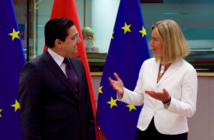LONDON (Reuters) – Aid flows from the European Union dropped last year for the first time in almost a decade as the euro zone crisis led 14 countries to cut financial assistance, anti-poverty group ONE said in a report published on Monday.
The aid drop jeopardises the chances of some African economies dispensing with external assistance in the future, said the group co-founded by Bono, the lead singer of Irish rock group U2.
Overall aid from the 27 members of the EU fell 1.5 percent in 2011 to 50.86 billion euros, the first drop since 2002, according to the report.
Fourteen EU members registered a decline. Greece and Spain, both struggling to reduce gaping budget deficits, slashed aid. Germany and Italy increased their programmes, but, as with the EU as a whole, were still far short of meeting their aid commitments, ONE said.
“Huge cuts in aid from Greece and Spain are not unexpected in this time of turmoil, but the poor record further across the board is worrying,” said Adrian Lovett, ONE’s executive director for Europe.
Concord, a Brussels-based confederation of 26 European relief and development groups, said at least nine EU states were planning further aid cuts this year, with reductions of 53 percent expected in Spain and 38 percent in Italy.
It praised nine countries for beating their aid targets in 2011 but criticised EU governments for wrongly counting as aid more than 7 billion euros that was spent on things such as refugee and student costs.
PROMISE
On current projections, EU members would be spending 0.44 percent of annual income on overseas development assistance in 2015, well short of the 0.7 percent promise they gave in 2005 to support the U.N.’s poverty alleviation goals, Concord said.
ONE calculated that the EU would need to increase its official development assistance by 42.9 billion euros between now and 2015 to meet its targets.
For Africa, the advocacy group’s particular focus, the prospect that further austerity will hit aid programmes could postpone the day when countries can stand on their own feet.
While Africa needs to rely primarily on its own tax revenues to tackle poverty, outside help can increase the governments’ ability to improve tax collection, combat corruption and attract investment, the group said.
Such steps, the group said, would help some African economies build “the long-term conditions for when external assistance is no longer required”.
“This is close to realisation in a growing number of countries. But we are not there yet.”
ONE calculated that the 15 countries that were EU members before 2004 needed to increase their aid to Africa over the period2004-2015 by 26.6 billion euros to honour their public pledges. As of last year the cumulative increase had reached 6 billion euros, or just 22.5 percent of the target.
Austria, France, Germany, Greece, Italy, the Netherlands and Spain had met less than a quarter of their promised increases, while Belgium, Britain, Luxembourg and Sweden were between 50 percent and 75 percent of the way there.
With the EU about to negotiate its budget for the period 2014-2020, ONE said that it would take bold political leadership to increase foreign aid at a time of hardship at home.
.






